MercoPress. South Atlantic News Agency
Tag: Axel Kicillof
-
Friday, May 9th 2014 - 07:01 UTC
Repsol/YPF 'marriage' definitively over; Spanish company ends 15-year presence in Argentina
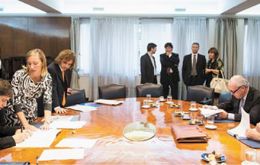
Spanish oil major Repsol signed a definitive settlement agreement Thursday with Argentine President Cristina Fernandez's administration, which transferred more than 5 billion dollars in bonds as compensation for the 2012 seizure of Repsol's controlling stake in energy firm YPF.
-
Wednesday, April 30th 2014 - 09:22 UTC
Argentina and Brazil agree to further integrate and prop their auto industries
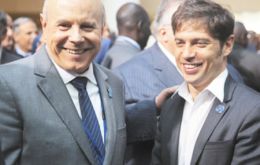
Argentina and Brazilian officials agreed to continue meeting regularly to solve as soon as possible bilateral trade problems mainly those referred to the auto industry. On Tuesday Argentine Finance minister Axel Kicillof and Industry minister Deborah Giorgi met their Brazilian counterparts, Guido Mantega and Mauro Borges in Brasilia.
-
Wednesday, April 30th 2014 - 03:49 UTC
Holdout hedge funds admit they prefer to negotiate with whoever succeeds Cristina Fernandez

Elliot Management Hedge Fund claimed on Tuesday that President Cristina Fernández administration refuses to negotiate a solution over Argentine debt in default, stating that they would prefer to seek a solution with the head of state's successor in 2015.
-
Tuesday, April 29th 2014 - 06:31 UTC
Argentina and Brazil plan to prop economies by stimulating the auto industry

Argentine Economy Minister Axel Kicillof and Industry Minister Débora Giorgi fly to Brasilia on Tuesday in a bid to swing the automobile trade balance in Argentina’s favor, with the sector accounting for the majority of a total 3.15 billion dollars trade deficit. From Brazil Finance minister Guido Mantega confirmed bilateral discussions on the auto industry and exports.
-
Wednesday, April 16th 2014 - 04:13 UTC
March inflation in Argentina: official 2.6%; opposition index, 3.3%
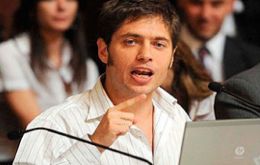
Official inflation in Argentina during March was 2.6%, according to Economy minister Axel Kicillof who underlined that during the month there was “a considerable deceleration in the increase of prices”, in most items with the exception of clothing and private schooling.
-
Thursday, April 10th 2014 - 06:17 UTC
Argentine top minister in Washington attending the 'ideologically bias” IMF assembly
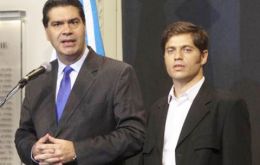
In a strong reply to the IMF report on the Argentine economy forecasting 0.5% expansion in 2014, the administration of President Cristina Fernandez said the multilateral organization suffers of an 'ideological bias' and its recipes only prompted the 'worst social and productive crisis in the history of Argentina'.
-
Wednesday, April 9th 2014 - 07:29 UTC
IMF joins Argentine GDP linked bonds controversy involving potential payment of 3bn dollars

The International Monetary Fund reported on Monday a steep deceleration of Argentina’s economic activity for 2014, in a context of “high uncertainty”, according to its latest World Economic Outlook released in Washington.
-
Monday, March 31st 2014 - 19:25 UTC
Brazil/Argentina agree on deal to promote bilateral trade by guaranteeing 'dollar liquidity'
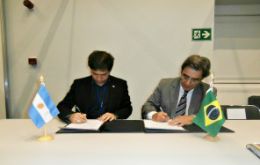
Brazil and Argentina signed a deal over the weekend that seeks to guarantee importers will have enough U.S. dollars to pay for exports, a move to increase trade between both nations that has been hit hard by a sharp depreciation of the Argentine peso.
-
Saturday, March 29th 2014 - 05:43 UTC
Argentina denies the subsidies reduction will have an inflationary impact
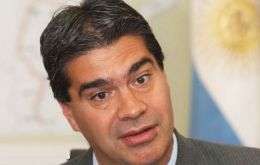
Argentina's new subsidies’ scheme will have an “insignificant” impact on prices since the whole package basically involves a 'redistribution' of funds, argued Cabinet Chief Jorge Capitanich, emphasizing the decision aims at “encouraging the rational and responsible use of public services.”
-
Friday, March 28th 2014 - 08:29 UTC
Argentina begins natural gas and water subsidies reduction in three stages
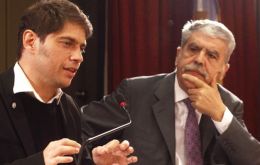
Argentina will cut expensive natural-gas and water subsidies this year which will have an increase impact in utilities' rates between 20% and 80% on average. The gas and water subsidies reduction will reach 80% of top consumers and the accumulative impact will range from the equivalent of 2.5 to 102 dollars, said the Ministry of Economy in a release.
